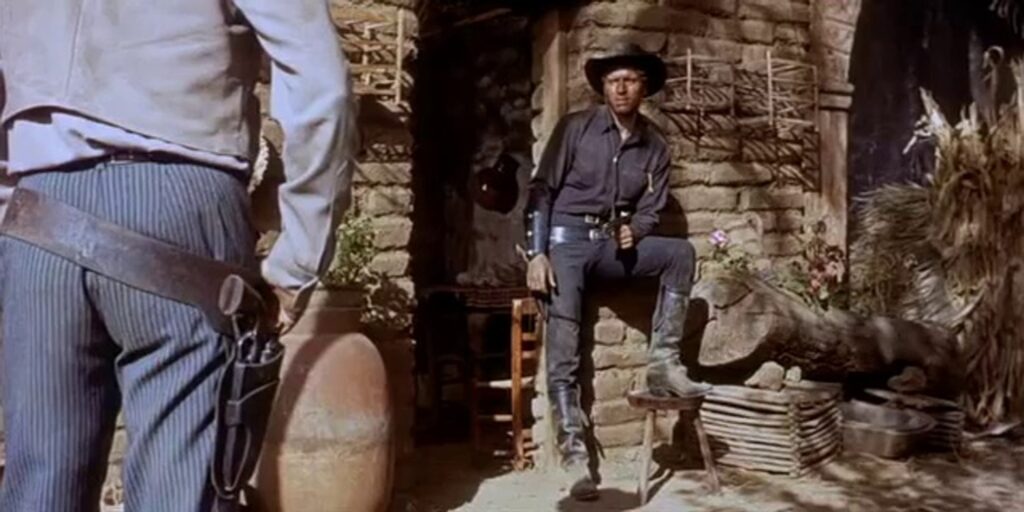
Vera Cruz (1954) is the second of two successive westerns that Robert Aldrich made for Hecht-Lancaster Productions at United Artists. At the time that Vera Cruz was made Lancaster was pursuing more mature projects rather than the crime and swashbuckling films that made him famous. The fact that Lancaster was developing and co-producing his films with Harold Hecht afforded him more freedom than most. In fact Vera Cruz is the first time that Lancaster plays the antagonist in one of his pictures. Besides Harold Hecht, producer James Hill and screenwriter Roland Kibbee were long time collaborators with Lancaster and form the core team behind Hecht-Lancaster, and later Hecht-Hill-Lancaster, Productions’ successes.
The story of Vera Cruz isn’t particularly revolutionary though the execution of the telling surely is. Vera Cruz is concerned with two men, Ben Trane (Gary Cooper) and Joe Erin (Burt Lancaster), who are veterans of the American Civil War that have traveled to Mexico to work as mercenaries in the Franco-Mexican War. Trane and Erin, along with Erin’s gang, are enlisted to aid the Marquis Henri de Labordere (Cesar Romero) in escorting Countess Marie Duvarre (Denise Darcel) and a secret fortune in gold to Vera Cruz, straight through the heart of Juarista territory. As the expedition makes for the coast Erin, Trane, the Marquis, the Countess, and General Ramirez (Morris Ankrum) of the Juarista army all try to out maneuver one another to claim the fortune in gold for themselves.
One of the reasons this narrative is so compelling in Vera Cruz is the nature of the relationship between the Gary Cooper and Burt Lancaster characters. What begins as a begrudging relationship born out of necessity evolves into one that is founded equally on admiration and disgust. It goes without saying that the personalities of these characters differed just as much as those of Lancaster and Cooper themselves. Ben Trane is the righteous and stoic Southern gentleman while on the other hand Joe Erin is the foul mouthed sadistic opportunist. As actors and characters butted heads before and behind the cameras a mutual respect remained constant.
Aldrich, a director sensitive to the emotional subtleties of the masculinist horse opera, shoots the scenes between Cooper and Lancaster as cramped two shots cut with tight close-ups. These visual cues highlight the emotional closeness of the characters via their intimate physical grouping. It’s even more poignant that Aldrich should block the final showdown between Lancaster and Cooper to draw out the moment of Lancaster’s death so that the resolution rests entirely in Ben Trane’s heartbreak over gunning down Joe Erin. The homoerotic qualities inherent to the western genre almost cease to be subtext in Vera Cruz.
However Vera Cruz isn’t as famous for its queerness as it is for Aldrich and Kibbee’s presentation of violence. The savagery and nihilism of Joe Erin and his gunslinging hooligans has a long legacy that extends from Sam Peckinpah to Sergio Leone and beyond. Vera Cruz represents a giant leap forward from the Romantic westerns of Howard Hawks and John Ford towards the Revisionist westerns of the seventies. This “leap” is largely a result of and reaction to WWII. The unprecedented loss of life and brutality of WWII had a tremendous impact on those who served, including Burt Lancaster. Those experiences, coupled with the trauma of coming home and acclimating to society gave birth to a certain national nihilism.
In cinema this nihilism manifested itself in Film Noir as much as it did in the westerns of Anthony Mann, Robert Aldrich, André De Toth, and Budd Boetticher. It’s in the westerns of these few filmmakers that the seeds of what was to come in the genre were sown. It’s in the amorality of the violence in these films like Vera Cruz, that the spectacle of of the gunfight transforms from myth to disturbing reality. Until WWII survival was never much of a concern for a western hero, but afterwards mortality became a frightening reality.
Even today Robert Aldrich’s treatment of homoerotic themes and violence in Vera Cruz is affecting. As is the case with Day Of The Outlaw (1959) and Ride Lonesome (1959), Vera Cruz feels formally contemporary; more at home in the canon of Leone and Corbucci than in the age of John Wayne and Henry Fonda. Vera Cruz may also be the finest film to come out of the collaboration between Aldrich and Lancaster. In short, Vera Cruz is must see American cinema.
